Camera shootout: OnePlus 9 Pro vs Samsung Galaxy S21 Ultra
The OnePlus 9 Pro promises some serious improvements to the brand’s camera prowess. We’ve been impressed by what we’ve seen from the phone so far, but what better way to really test out OnePlus’ claims than by pitting the smartphone against one of the best in the business — the Samsung Galaxy S21 Ultra?
Click here to view the full-res files, if you fancy conducting your own analysis. Without delay, let’s dive right on in.
More Samsung Galaxy S21 Ultra camera tests:
- Camera shootout: Samsung Galaxy S21 Ultra vs iPhone 12 Pro Max
- Camera shootout: Samsung Galaxy S21 Ultra vs Huawei P40 Pro Plus
- Camera shootout: Samsung Galaxy S21 Ultra vs Google Pixel 5
OnePlus 9 Pro vs Samsung Galaxy S21 Ultra: Camera specs
| OnePlus 9 Pro | Samsung Galaxy S21 Ultra | |
|---|---|---|
| Main Camera | 48MP (12MP binned) f/1.8 aperture 23mm focal length 1/1.43" sensor dual pixel PDAF, OIS |
108MP (12MP binned) f/1.8 aperture 24mm focal length 1/1.33" sensor PDAF, OIS |
| Wide-angle | 50MP (12.5MP binned) f/2.2 aperture 14mm focal length 1/1.56" sensor |
12MP f/2.2 aperture 13mm focal length 1/2.55" sensor dual pixel PDAF |
| Telephoto zoom | 8MP f/2.4 aperture 77mm focal length PDAF, OIS 3.3x optical zoom |
10MP f/2.4 aperture 70mm focal length 1/3.24" sensor dual pixel PDAF, OIS 3x optical zoom |
| Periscope zoom | 10MP f/4.9 aperture 240mm focal length 1/3.24" sensor dual pixel PDAF, OIS 10x optical zoom |
|
| Focusing | Laser AF system | Laser AF system |
| Selfie | 16 MP f/2.4 aperture 1/3.06" sensor |
40 MP f/2.2 aperture 26mm focal length 1/2.8" sensor PDAF |
Daylights, colors, and exposure
OnePlus made a big fuss about its collaboration with Hasselblad to improve color processing in the OnePlus 9 series and the camera package definitely steps up in this regard this year. Likewise, Samsung has (slightly) toned down its historically overzealous color processing this generation, making for an exciting comparison.


Generally, speaking, both handsets handle color and exposure very well. It’s familiar territory in some regards, with Samsung pumping up the color saturation for generally more vibrant pictures. This is particularly noticeable in greens and sky blues. The Galaxy S21 Ultra doesn’t produce the most realistic-looking pictures.
Our verdict: OnePlus 9 Pro review | Samsung Galaxy S21 Ultra review
The OnePlus 9 Pro does a generally excellent job at color processing, erring much more on the side of realism. However, blue skies tend to come out a bit too purple, and some images are also too washed out compared to Samsung’s. Although this may be a bonus if you like to edit all your pictures manually. Overall, the OnePlus 9 Pro doesn’t seem to have quite as wide a dynamic range as the Galaxy S21 Ultra, which we’ll see more of later.




When it comes to white balance, Samsung’s is the warmer of the two in a number of shots I took. It’s not too overbearing most of the time. However, a number of images came out with a noticeable red tint and the warmer look further adds to the saturated appearance of Samsung’s photos.
Overall, virtually everyone should be well served with the general quality of pictures taken from these two main cameras. There’s both excellent and a joy to shoot with in good lighting.
Detail
Detail and noise have historically let OnePlus down but there are again noticeable improvements this generation. Despite the phones boasting very different 48MP and 108MP sensors, the two bin down to produce 12MP results. As such, it’s the sensor size and processing that will be the determining factor in detail capture.




Viewed at full-frame, there are no obvious noise or detail problems when shooting in a variety of scenarios. At a glance, the OnePlus 9 Pro often appears the tad sharper of the two in decent lighting. Although the phone equally appears slightly noisier in less ideal situations. Upon closer inspection, it’s clear that OnePlus applies a much heavier sharpening pass than even Samsung.
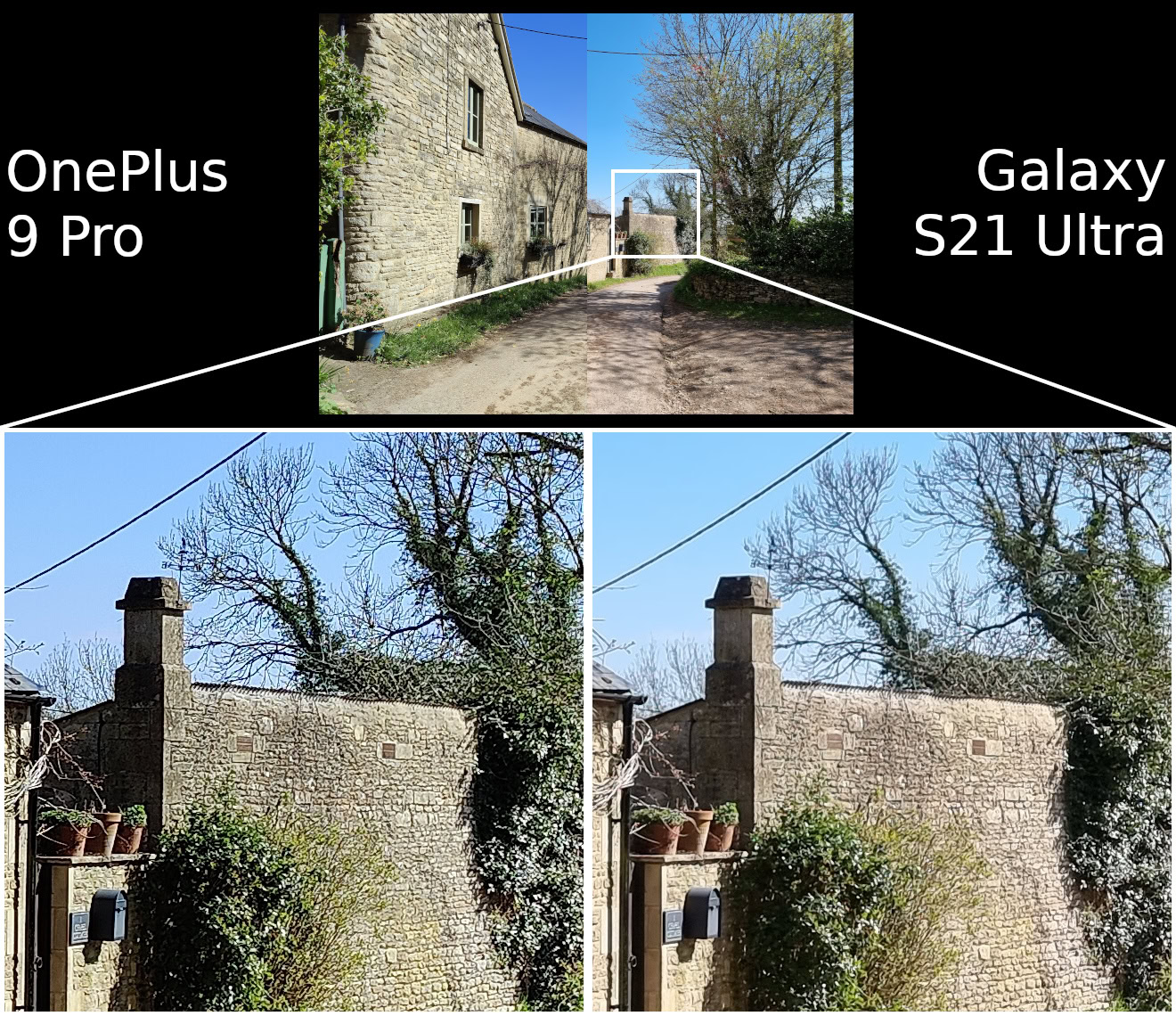
Personally, I prefer a hands-off approach to over-sharpening. Too much produces harsh lines, haloing, and a general lack of depth. The OnePlus 9 walks a very fine line here. Most of the time, the sharpening pass looks fine and is sometimes better than Samsung’s occasionally overly soft presentation. But the ugly harshness is definitely something to be aware of if you like to crop and edit your shots.
Related: The best camera phones you can get
As you’ll see later on, the OnePlus 9 Pro becomes noisier in low light, so isn’t always consistent with detail capture. Likewise, Samsung has an even softer appearance when using Night mode. But overall both handsets offer exceptional detail in the vast majority of day-to-day shooting environments.
HDR capabilities
Both the OnePlus 9 Pro and Samsung Galaxy S21 Ultra provide extremely powerful HDR technologies. Both capture vivid colors with well-balanced shadows and highlights.
There are marginal differences between the two in HDR environments. In most HDR shots I took, the OnePlus 9 Pro exposes a little brighter than Samsung’s phone, which instead does a slightly better job at extracting highlight details. Overall though, the two handle pretty much all HDR environments very well.




I had to push the phone through some quite tricky HDR environments to showcase more meaningful differences. Eventually, I found a couple of strongly backlit environments that showcased the marginal superiority of Samsung’s HDR technology.
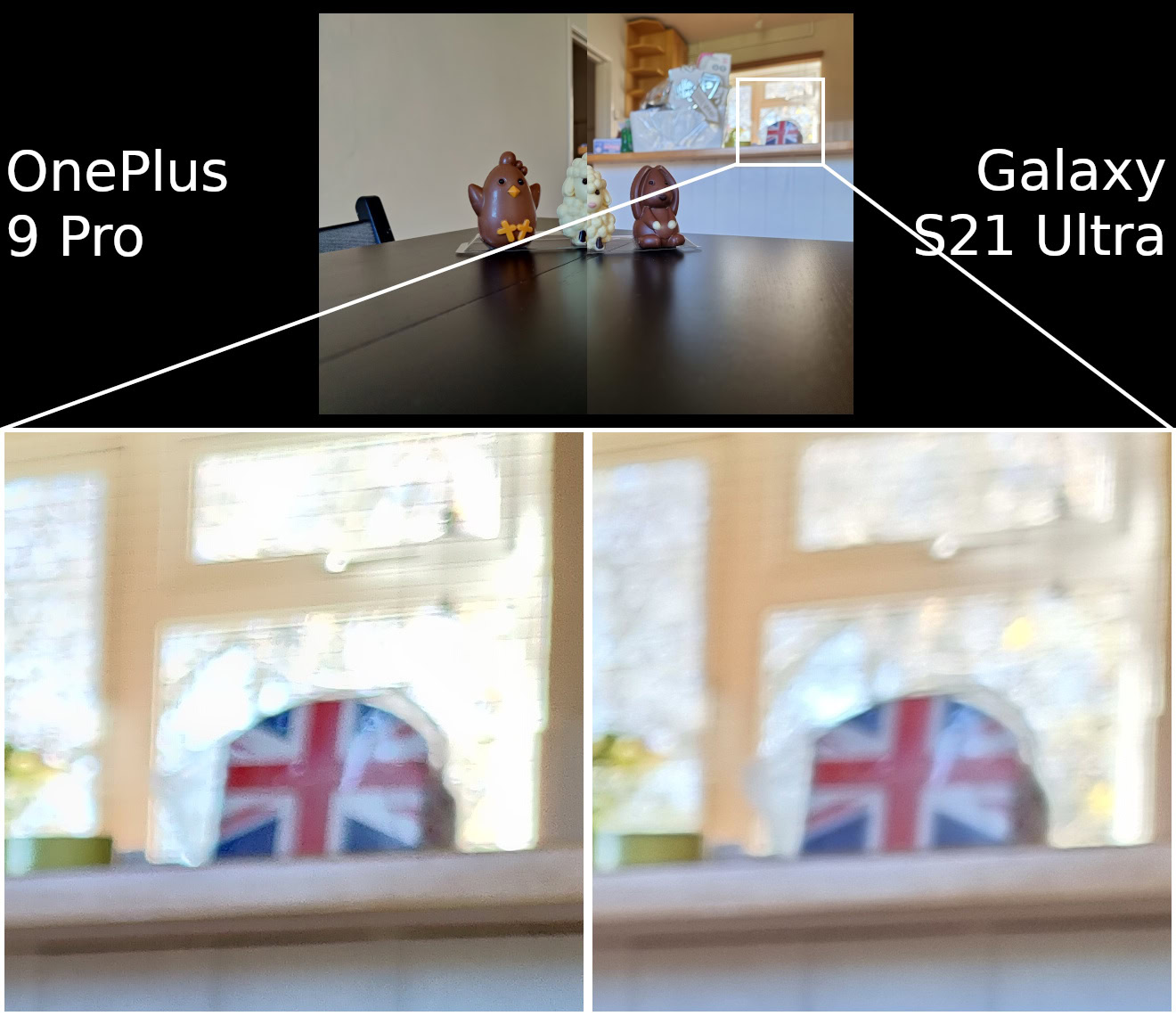
The above picture showcases a subtle but important difference. There’s a small amount of clipping in the window in OnePlus’ picture but none in Samsung’s. The Galaxy S21 Ultra does a marginally better job at avoiding clipped highlights while still balancing the shadows and colors. But again, there’s not a huge difference in most situations.
Photography terms explained: ISO, aperture, shutter speed, and more
Shooting in low light
As you’d expect from the slightly smaller sensor, the OnePlus 9 Pro takes grainier pictures in less ideal lighting situations. The phone holds up as well as the Samsung with dim indoor lighting. It’s only when you reach notably darker conditions that the OnePlus 9 Pro appears noticeably worse. Both in terms of noise and color reproduction. The shots below are taken without the aid of night modes.




OnePlus may have showcased heavier processing so far in our shootout, but that situation changes in very low-light shooting conditions with night modes enabled.
In the example below, Samsung’s flagship does more with the limit light but with some caveats. There’s more detail in the sky, better exposure on the bush, and generally a fraction more dynamic range throughout the picture. However, the OnePlus 9 Pro’s Nightscape mode produces much cleaner details than Samsung’s slightly mushy appearance. Samsung’s night mode is definitely too heavy-handed when it comes to denoise and smoothing. Although the 9 Pro subdues the orange glow from the streetlight a little too much.


Related: 6 tips for improving smartphone low light photography
Pushing the lights down really low shows just how good software has become at making up for limited hardware sensor sizes. Although it’s clear that there are still some notable compromises to image quality to extract detail from this image. This scene is lit entirely by two LEDs, so was virtually pitch black.
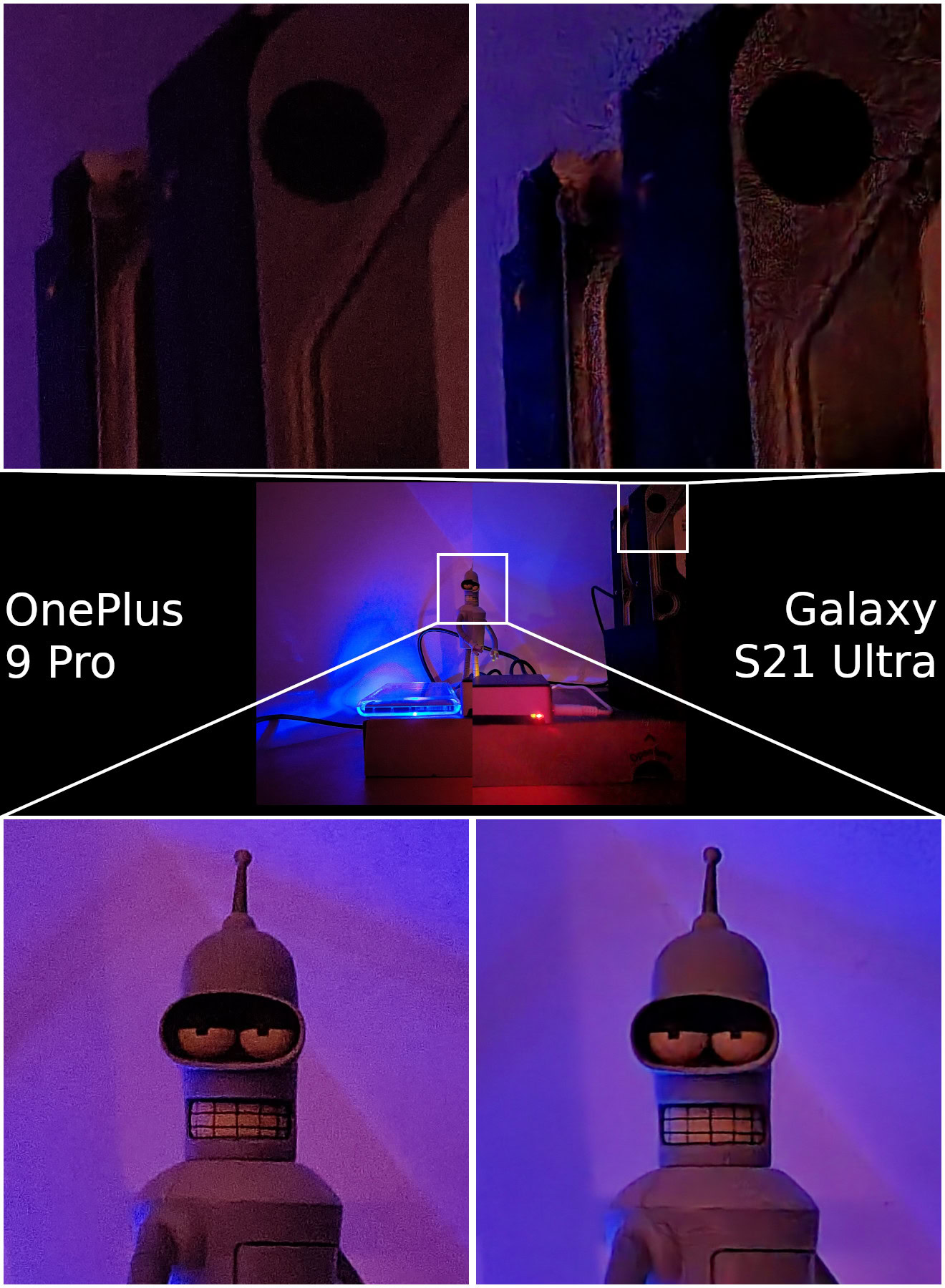
Again the OnePlus is much noisier, but you’ll notice uglier smudging artifacts when cropping in on Samsung’s picture. The edges of the hard drives look like a machine learning algorithm’s gone haywire. Even so, both pull out a surprising amount of detail and color in what is otherwise complete darkness. It’s a bit of a toss-up here about which looks better. Pros and cons I suppose.
Overall, both of these phones take some of the better pictures out of all the smartphones I’ve tested when the lights go down. Neither is flawless, but I’ll give the nudge to Samsung here.
Zooming in on details
Samsung’s premium camera package justifies its higher price tag with not one but two zoom cameras. The 10x periscope camera grants the Galaxy S21 Ultra vastly improve long-range quality compared to the OnePlus 9 Pro. Details, color balance, and dynamic range are hands down better on the Galaxy S21 Ultra at 10x.
Performance is closer when zooming to around 2x and 3x. However, even here you’ll spot some issues with the OnePlus 9 Pro’s zoom setup. There are noticeable sharpening and color artifacts in OnePlus’ results at these zoom levels. It almost looks like the images are being cropped from the 48MP sensor, sans pixel binning. The results are not great and forget about using the zoom beyond 5x.














OnePlus’ telephoto camera doesn’t appear to be used at all until 3.3x and beyond. Unlike Samsung, there are no signs of hybrid image stitching to improve image quality. Sadly OnePlus’ sensor struggles with less ideal lighting and suffers from chromatic aberration (purple halos) in the images above. It’s really not a great zoom setup for a premium-tier phone.














That said, Galaxy S21 Ultra doesn’t provide a flawless zoom setup. The software zoom used between the cameras’ optical zoom points can look worse than OnePlus’ when it comes to fine details. There’s a noticeable dip in quality particularly around 5x – 7x, where it’s a much closer run contest between the two. At least in terms of resolution and detail capture.
Overall though, the Galaxy S21 Ultra more consistently takes the best-looking long-range pictures. Samsung also does a much better job at ensuring consistent colors, exposure, and white balance when switching between zoom levels. While both offer flexible shooting options between their wide, main, and zoom camera setups, the Galaxy S21 Ultra is definitely the better winner here.
Wide-angle lenses
On paper, the Galaxy S21 Ultra and OnePlus 9 Pro offer virtually identical focal lengths for their wide-angle cameras. Both offer a significant step back from the main camera, allowing you to fit much more into your shot. Samsung’s wide-angle camera is technically a fraction wider, but it makes virtually no difference to the images you can capture.
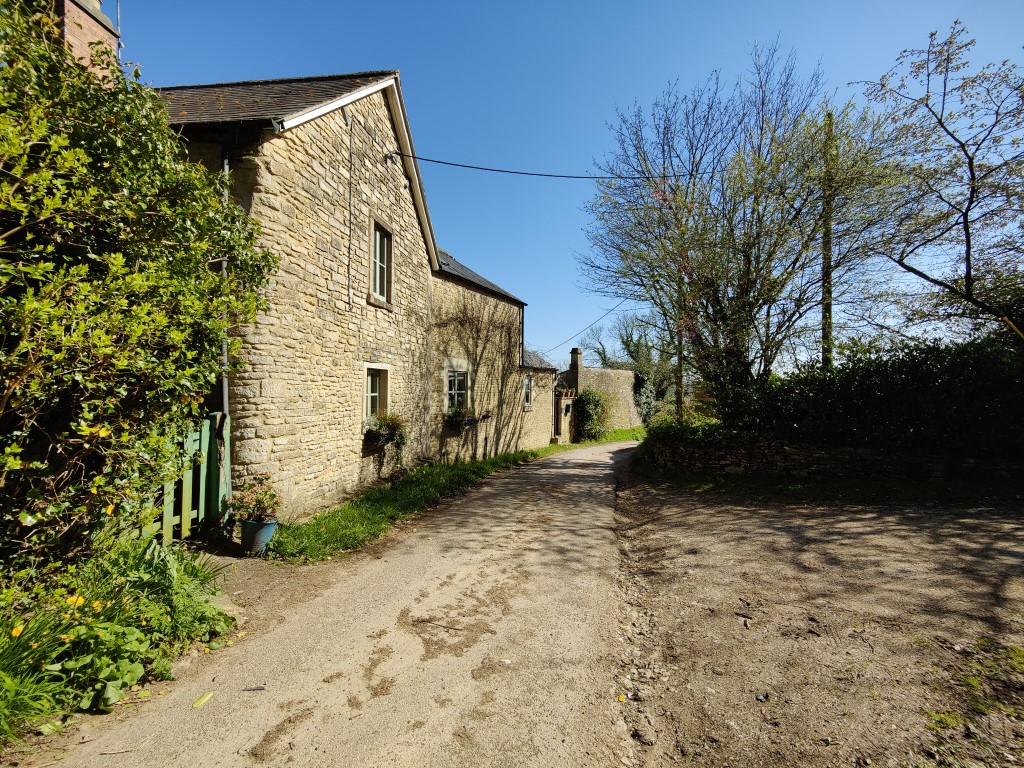 OnePlus 9 Pro - 1x OnePlus 9 Pro - wide angle
OnePlus 9 Pro - 1x OnePlus 9 Pro - wide angle
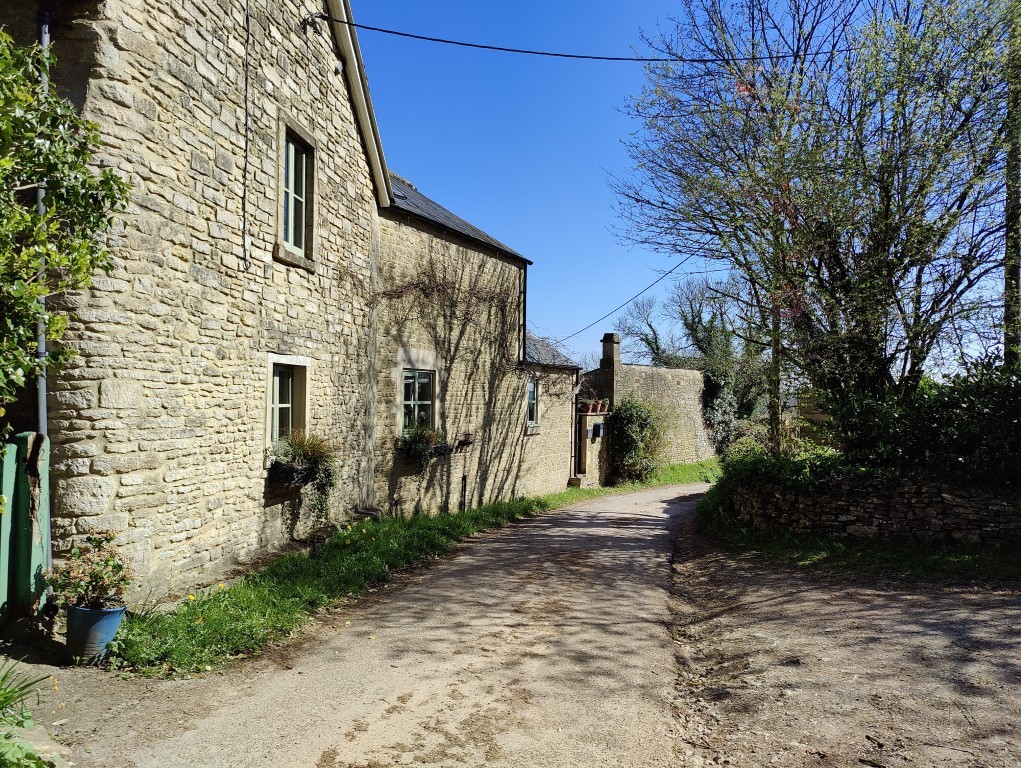
 Samsung Galaxy S21 Ultra - 1x Samsung Galaxy S21 Ultra - wide angle
Samsung Galaxy S21 Ultra - 1x Samsung Galaxy S21 Ultra - wide angle

Interestingly, Samsung does a much better job maintaining a consistent color profile between its main and wide-angle cameras. Many of the pictures I took with the OnePlus 9 Pro ended up with warmer results from the wide-angle lens compared to the main camera.
One of the bigger hardware differences between the OnePlus 9 Pro and Samsung Galaxy S21 Ultra is found in their wide-angle cameras. OnePlus includes a large 1/1.56-inch sensor compared to the small 1/2.55-inch sensor inside Samsung’s handset. This choice of hardware makes a huge difference to detail capture.
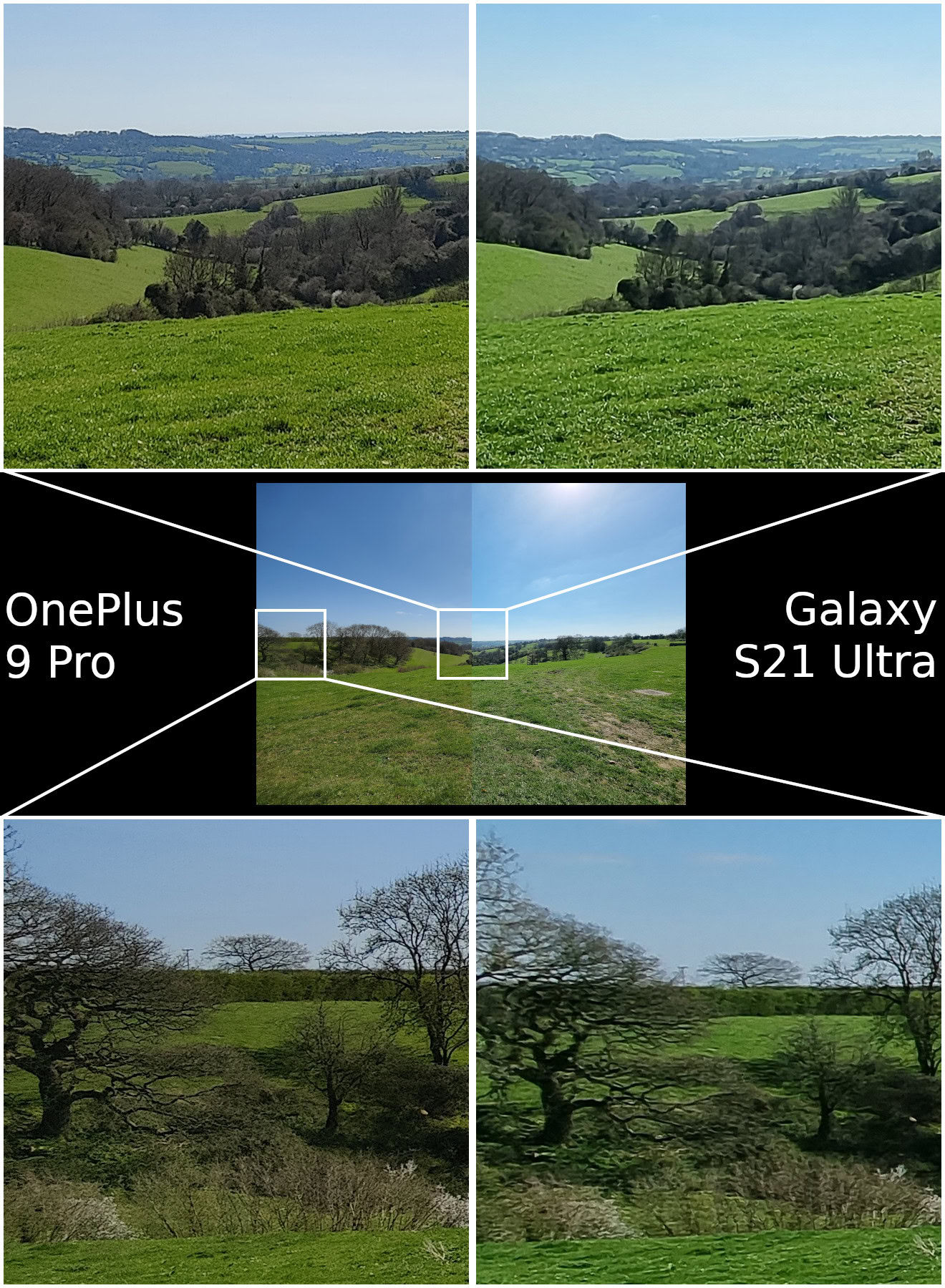
Even in the center of the frame, the OnePlus 9 Pro captures far more detail than the Galaxy S21 Ultra, especially when shooting long-range landscapes. Samsung’s choice of small sensor relies far too heavily on denoise and sharpening to clean up its image. Both handsets correct for lens distortion reasonably well a the frame edges and corners, but again OnePlus produces much more realistic details around the fringes. Even if the results are a little noisy.
Read more: The complete guide to ultra-wide camera phones
While few users will crop in on their wide-angle pictures like this, the difference in detail capture is important for those who want to edit, print, and blow up their images. While Samsung’s wide-angle lens wins on color balance, OnePlus has a clear advantage in detail capture.
Bokeh and portraits
Moving into the final section of our shootout, we’re back to the phones performing similarly admirably with portraits and bokeh blur.
Both the OnePlus 9 Pro and Samsung Galaxy S21 Ultra offer solid bokeh edge detection, likely owing to their similar use of a laster autofocusing system to assist in-depth detection. Neither is quite perfect, especially at capturing stray loose hairs, but both are very good.
Blur quality is also nicely presented on both handsets. Although I slightly prefer the softer appearance of OnePlus’ bokeh effect. Samsung’s phone is a tad more aggressive at applying blur closer to the focal point, but you often want to be able to make out a bit of the background.




Both phones can also apply bokeh blur to your selfie photos. Edge detection is definitely not as good when using the front camera, which can be seen in the stray hairs in the pictures below. Although again both results are more alike than they are different in terms of overall quality.




In good daylight, the two selfie cameras capture excellent skin tones and details. I have no complaints about either smartphone here. However, Samsung’s selfie camera pulls ahead with indoor lighting, as the example below shows.
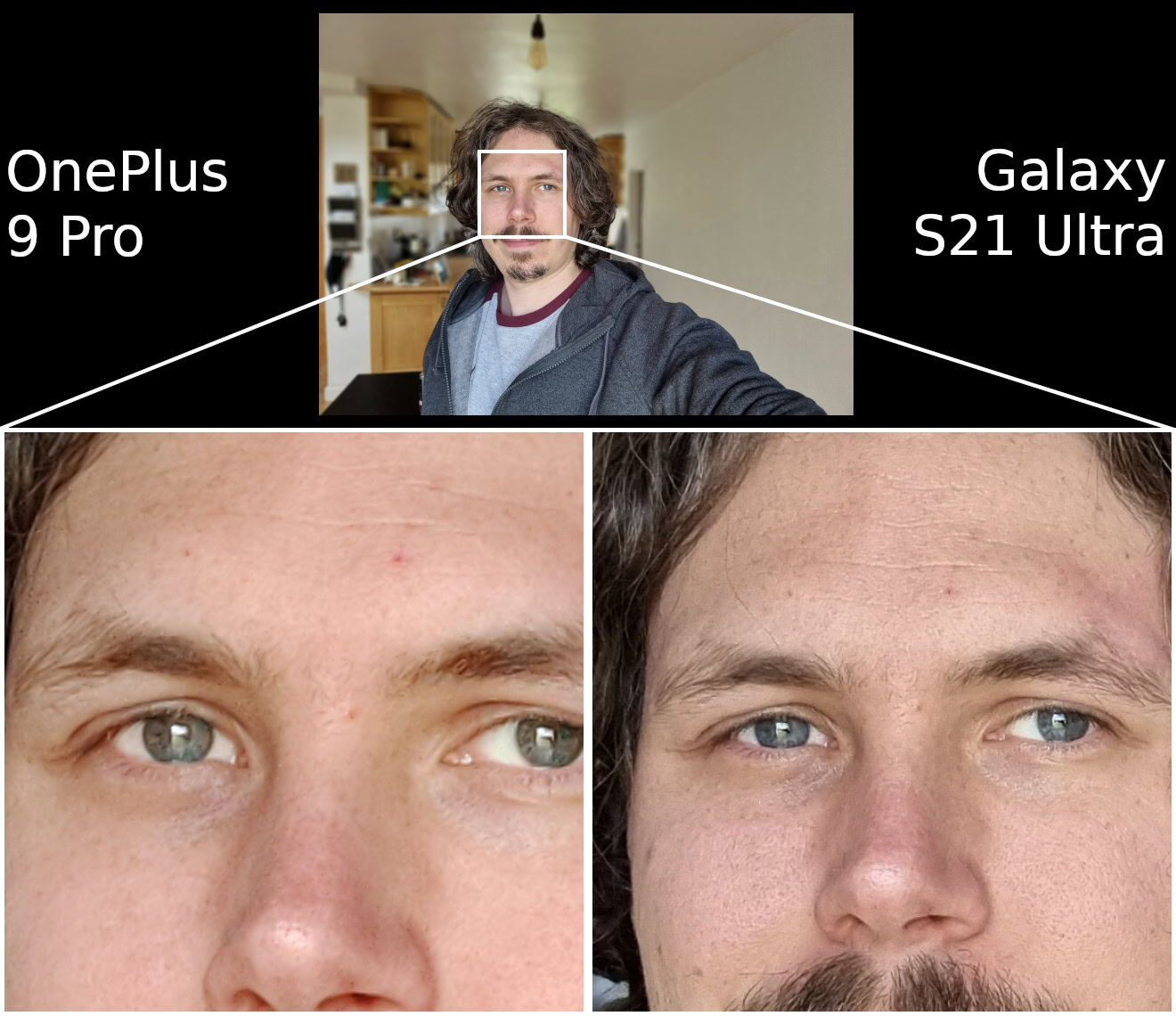
There’s not too much to complain about at full-frame, but cropping in on facial details reveals a much softer presentation for the OnePlus 9 Pro in less ideal lighting conditions. The slightly smaller sensor and narrower aperture don’t quite keep up with the Galaxy S21 Ultra here. Samsung’s flagship pulls further ahead with selfie quality as you turn the lights down lower, making it the better pick for those who resort to their front-facing camera more often.
OnePlus 9 Pro vs Samsung Galaxy S21 Ultra camera test: The verdict

The OnePlus 9 Pro features the company’s best smartphone camera yet. Image quality from the main camera rivals the very best in the business. This is particularly when it comes to color realism (except the purple skies), which bests Samsung’s punchy oversaturation, as well as providing solid HDR and Nightscape, capabilities. The wide-angle camera, although offering inconsistent colors, scores a major win for image quality versus Samsung’s ultra-expensive handset and sets a new benchmark for image quality.
However, the OnePlus 9 Pro’s selfie camera performs pretty poorly in less than ideal lighting conditions. The zoom camera is also a hot mess of artifacts and over-sharpening, even at 2x. While the Hasselblad partnership has undoubtedly improved the main camera, it’s a shame that the same attention to detail hasn’t quite been paid to the broader package.
Samsung’s Galaxy S21 Ultra is one of, if not the best smartphone camera packages out there for its robust combination of consistency and versatility. Although the OnePlus 9 Pro goes toe to toe in common scenarios and scores a few wins of its own, the Galaxy S21 Ultra remains the better all-around option for those who value long-range zoom, low light shooting, and selfies.
The OnePlus 9 Pro takes excellent pictures but isn't as consistent all-round as the Galaxy S21 Ultra.
Of course, the OnePlus 9 Pro costs $969 rather than $1,199, so it was always unlikely to rival Samsung across the entire field. For that price, the 9 Pro is finally a OnePlus smartphone that should be on every mobile photographer’s radar.
from Android Authority https://ift.tt/3tme7SA

Post a Comment